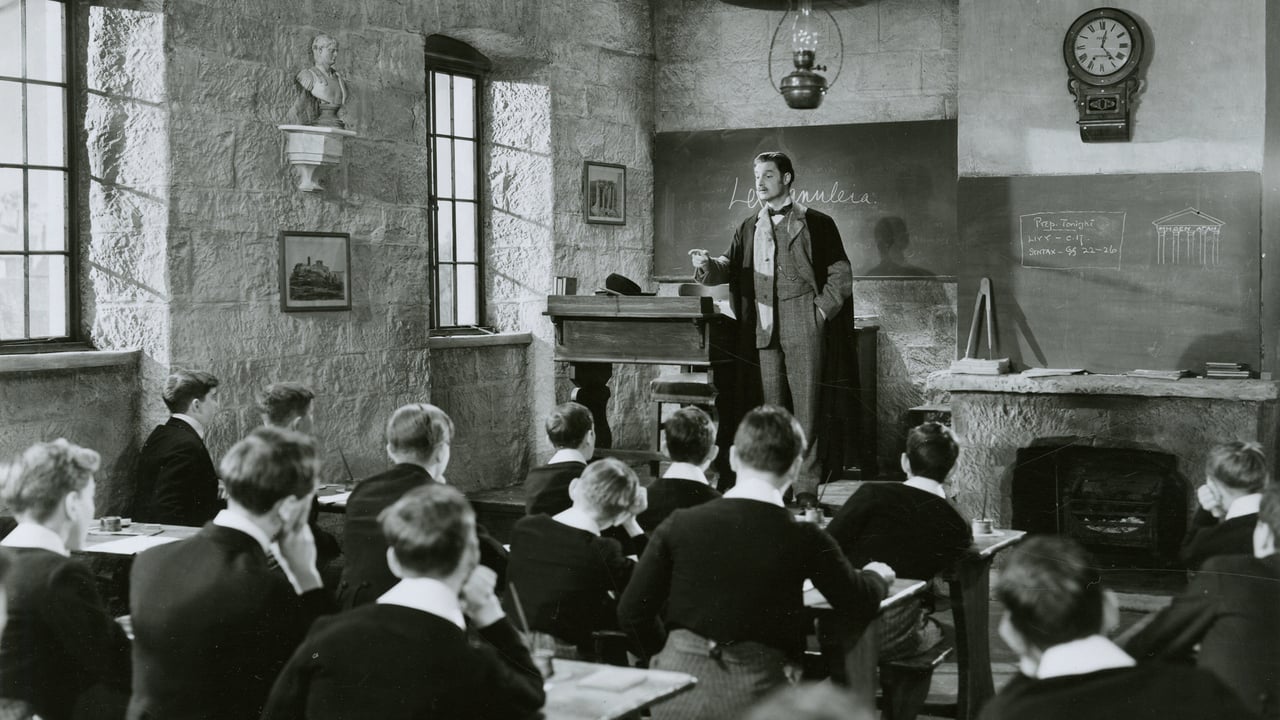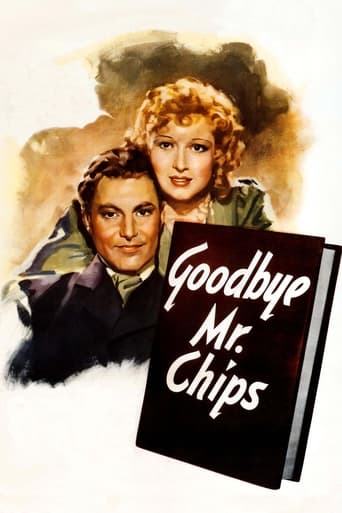Jackson Booth-Millard
This looked like a nice, simple and charming black-and-white film, it is critical acclaimed, and Clark Gable in Gone with the Wind lost out the Academy Award for Best Actor to this film's leading star, I had to see it, from Oscar nominated director Sam Wood (A Night at the Opera, The Pride of the Yankees, For Whom the Bell Tolls). Basically Charles Edward Chipping, fondly referred to as Mr. Chips (Oscar winning Robert Donat), in 1933 is a retired schoolteacher and former headmaster at the traditional Brookfield Boarding School, one of the oldest and most respected boys schools in England, the film goes into flashback as he recalls his life and teaching career. Chipping first arrived at Brookfield aged 25 as a Latin teacher in 1870, he becomes the target for many practical jokes, he reacts by imposing strict discipline, he is respected but disliked, as time passes however his relationship with his pupil improves, and he becomes senior master. Chipping is disappointed not to receive an appointment as the house master, but his despair is lifted when the German teacher Max Staefel (Paul Henreid) invites him for a walking holiday to his native Austria, while mountain climbing he encounters feisty English suffragette Kathy Ellis (Oscar nominated Greer Garson). Charles and Kathy meet again in Vienna and dance a waltz, he uses the music to declare his love for her, Kathy is considerably younger and livelier than Charles, but she shares affection for him and they get married, they return to England, Kathy finds a home in the school and charms everyone with her warmth. The marriage is tragically short however as Kathy dies during childbirth, along with the baby, but she brings Mr. Chips out of his shell and shows him how to be a better teacher, as the years pass Chips has become a much-loved institution to the school, developing a rapport with generations of pupils, teaching the sons and grandsons of many of his earlier pupils. In 1909 Chips is pressured to retire for a more "modern" headmaster, the boys and the board of governors take his side and want him to stay until he is 100, he does finally retire in 1914 at age 69, only to be summoned back as an interim headmaster during the time of the First World War, due to a shortage of teachers, he insists the boys continue translating Latin, even during a bombing attack occurring. Many names of former boys and teachers that have died are read aloud in the school's Roll of Honour every Sunday as the war continues, Chips finds out Max Staefel has died fighting on the German side, he also reads out his name in the chapel. Mr. Chips permanently retires in 1918, he is on his deathbed in 1933 and overhears his friends remarking that he never had children, Chips responds "But you're wrong. I have! Thousands of them, thousands of them – and all boys". Also starring Terry Kilburn as John Colley / Peter Colley I / Peter Colley II / Peter Colley III, John Mills as Peter Colley as a young man, Judith Furse as Flora, Lyn Harding as Dr. Wetherby, Milton Rosmer as Chatteris, Frederick Leister as Marsham and Louise Hampton as Mrs. Wickett. Donat, who I mainly knew for The 39 Steps, gives a superb performance as the kind-hearted Latin teacher and headmaster with a subtle and worldly-wise manner, and a large moustache, and Garson makes a great introductory performance as his beautiful love interest, there is a well-cast musical remake with Peter O'Toole, but this is indeed the definitive version, it is so simple, but so wonderfully moving, it proves that any nice man can be a great hero, a brilliant period drama. It was nominated the Oscars for Best Picture, Best Writing, Screenplay, Best Sound and Best Film Editing. Arthur Chipping was number 40 on 100 Years, 100 Heroes & Villains, and the film was number 46 on 100 Greatest Tearjerkers. Very good!
Prismark10
Goodbye Mr Chips might look sentimental nowadays and Robert Donat's nuanced performance might seem unremarkable but this film is still staggering.Donat is Mr Chippings, a new keen arrival at Brookfield prep school as the somewhat stuffy English prep school. His first day of teaching is unfortunate as the pupils misbehave and the headmaster takes control by thrashing all the boys in his class. Mr Chippings is determined to succeed and he those, teaching classics in a somewhat stuffy manner and administer discipline when he needs to. However despite all the years he has been at the school he has never inspired much love from the pupils or even much respect from his fellow teachers. He is passed over as house master.When a fellow teacher persuades him to go abroad to the Alps he meets Katherine (Greer Garson) and both quickly fall in love, well the river Danube certainly looked blue to them. They fall in love and marry.Once his wife arrives at school, things change with the stuffy Mr Chippings or Chip as his wife calls him. His fellow teachers are enchanted by her and he comes out of shell with the pupils, cracking jokes and inviting them over to tea parties.Sadly wedded bliss is short as Katherine dies in childbirth but Chips stays on at school through the decades from the late Victorian era and through the Great war, eventually promoted to headmaster and respected and loved by teachers and generations of pupils alike.This is still a cracking film, the director uses little tricks to mark the passage of time. I always think that this adaptation foresaw another conflict with the Germans in World War 2 with its depiction of the Great War years and its affect on the grown up pupils and their families. Mr Chips had to read out names of the fallen regularly, even the teacher who took him to the Alps who died fighting with the Germans.Although the film might nowadays look slightly cheesy, sentimental and light on plot. It still asks questions of the purpose of teaching which is relevant today, as the elder Mr Chips tells the governing body, the newfangled teaching methods introduced is all about results and getting the new captains of industry ready without any love for learning. This is a debate that has never grown old.
kenjha
This drama recounts the life and times of an English school teacher. Donat beat out James Stewart in "Mr. Smith Goes to Washington" for this performance. Jimmy was robbed! It's the type of performance the Academy loves, as Donat gets to age sixty years through the film and the makeup artists have done a fairly good job. However, it seems to be a performance without much depth, relying instead on mannerisms and a high-pitched delivery. The actor doesn't get much help from the script, which fails to show why Mr. Chips is such a beloved teacher. Garson makes a terrific screen debut and lends the film its best moments. A similar film that is far superior is "The Browning Version" with Michael Redgrave.

